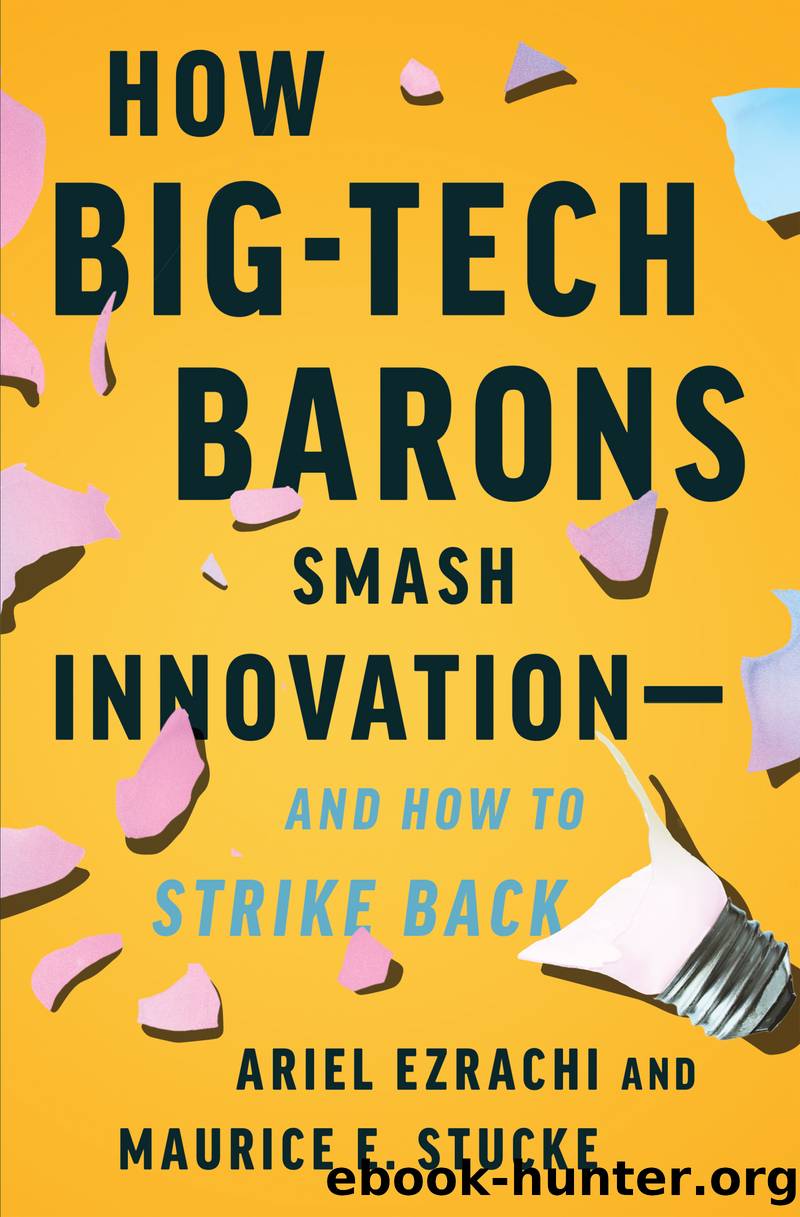How Big-Tech Barons Smash Innovationâand How to Strike Back by Ariel Ezrachi

Author:Ariel Ezrachi
Language: eng
Format: epub
Publisher: HarperCollins
Published: 2022-05-07T00:00:00+00:00
Reflections
The ideological platter, even when exposed, remains hard to resist. It fits into a broader free-market narrative that assumes large players won the competition fairly and have the edge over others. The Tech Barons have poured a lot of money into trusts, grant providers, think tanks, and academic institutions to propagate this ideological platter.72
When some academics warn of regulatory capture, they rarely point to their home institutions. And yet, increasingly, universities are being harnessed and used by the Tech Barons to advance their narrative. One example is George Mason Universityâs Antonin Scalia Law School. While the FTC was investigating Google from 2011 to 2013, âGoogle contributed at least $762,000â to the public universityâs Law and Economics Center, âwhich was used to support numerous GMU studies and academic conferences backing the search giantâs position that the company had not acted anticompetitively.â73 For these purported academic conferences, George Masonâs dean (a state employee) reportedly coordinated with Google as to the speakers, who unsurprisingly endorsed a hands-off approach.74 Google, Amazon, Facebook, and Qualcomm were also substantial funders of George Masonâs Global Antitrust Institute, another university center âthat routinely defends the companies on antitrust issues.â75
The criticism is that the Tech Barons fund these centers to churn out policy papers favorable to their position and send professors and graduates to critical jobs at agencies like the FTC. In reporting on the findings by the Tech Transparency Project, Bloombergâs David McLaughlin noted how George Mason helped shape the FTCâs workforce and âinfused it with a laissez-faire philosophy favorable to the schoolâs tech donors.â76 George Mason also provides training programs for judges and antitrust enforcers from the US and elsewhere that promote a simplified narrative that âthe best way to foster competition is to maintain a hands-off approach to antitrust law.â77
A congressional hearing on âReviving Competitionâ underscored the distorting effect of this intellectual capture.78 After listening to a presentation by Tad Lipsky, a director at George Masonâs Global Antitrust Institute, New York congressman Mondaire Jones was remarkably frank:
If we wanted to hear the views of Amazon, Google, or Qualcomm we would have invited them. When a CEO comes before this committee, I understand that they are going to advocate for their own interest. . . . But when your institute is funded by secret donations from big tech companies, you today come as a wolf in sheepâs clothing, and I would submit that the American people deserve to know the truth. The truth is that secret corporate funding, like yours, has distorted our discourse for far too long. For decades institutes like yours have massed corporate money to protect monopoly power. Institutes like yours have worked to âteachâ judges and regulators to let their guard down as corporate funders, like yours, came to dominate our economy. The American people, of course, are paying the price. The corporations who wrote your paychecks are now not only the gatekeepers for our economy, they are the gatekeepers for our democracy . . .79
Big tech companies also support other universities, policy groups, and NGOs.
Download
This site does not store any files on its server. We only index and link to content provided by other sites. Please contact the content providers to delete copyright contents if any and email us, we'll remove relevant links or contents immediately.
International Integration of the Brazilian Economy by Elias C. Grivoyannis(111061)
The Radium Girls by Kate Moore(12029)
Turbulence by E. J. Noyes(8051)
Nudge - Improving Decisions about Health, Wealth, and Happiness by Thaler Sunstein(7709)
The Black Swan by Nassim Nicholas Taleb(7130)
Rich Dad Poor Dad by Robert T. Kiyosaki(6633)
Pioneering Portfolio Management by David F. Swensen(6301)
Man-made Catastrophes and Risk Information Concealment by Dmitry Chernov & Didier Sornette(6019)
Zero to One by Peter Thiel(5802)
Secrecy World by Jake Bernstein(4753)
Millionaire: The Philanderer, Gambler, and Duelist Who Invented Modern Finance by Janet Gleeson(4478)
The Age of Surveillance Capitalism by Shoshana Zuboff(4293)
Skin in the Game by Nassim Nicholas Taleb(4250)
The Money Culture by Michael Lewis(4207)
Bullshit Jobs by David Graeber(4192)
Skin in the Game: Hidden Asymmetries in Daily Life by Nassim Nicholas Taleb(4007)
The Dhandho Investor by Mohnish Pabrai(3766)
The Wisdom of Finance by Mihir Desai(3748)
Blockchain Basics by Daniel Drescher(3583)
